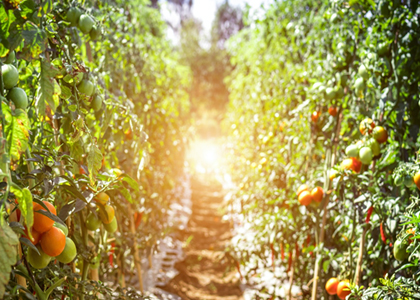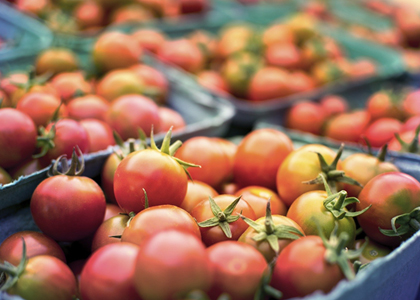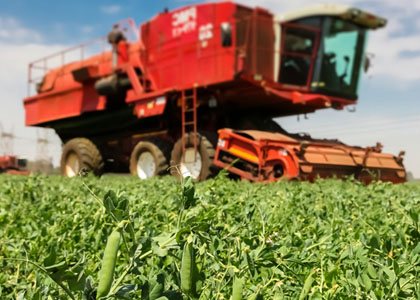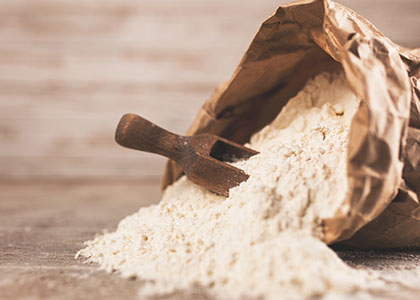Home / Blog / 3 reasons why your business should partner with a comprehensive agricultural supplier
SUMMARY
Saudi Arabia navigated the worst of the pandemic with little change to its food supplies. This is because the government has been aggressively working for the last few years on strengthening its sourcing supply chains, making smart investments abroad, and introducing progressive and forward-thinking agricultural policies within the Kingdom.
But even with all this, the country remains highly dependent on grain imports—particularly wheat, barley, soybean, and rice. Food security has been and remains a top priority, with the government backing and encouraging sustainable local agricultural produce through loans, tax exemptions, and support.
Consider, for example, that at the peak of the pandemic, the Saudi government announced a set of private sector relief packages totaling almost USD 61 billion. This included the postponement of government dues, wage subsidies, and tax-related measures that supported different sectors of the economy. Specifically, the measures extended a 30% discount on utility bills for the commercial, industrial, and agricultural sectors to allow ease of operation. Similarly, in May 2020, the Kingdom allocated 2 billion riyals (USD 533.3 million) to fund the import of agriculture products to help secure food supplies amid coronavirus fears.
In 2021, the government is once again focusing on measures that encourage alternative means of local food production. This includes an upgrade from existing farming infrastructures, a move to hydroponic and aeroponic farming methodologies, incorporation of digital tools like AI, IoT, and smart tech, and widespread training facilities and support.
Farming businesses with an eye on the future are best advised to take advantage of these trends and partner with a supplier who can facilitate a forward-oriented agenda.
INDEX
- Facilitate advanced farming operations.
- Manage reliable supply chains.
- Provide access to information, solutions and new markets.
3 REASONS WHY YOUR BUSINESS SHOULD PARTNER WITH A COMPREHENSIVE AGRICULTURAL SUPPLIER
Last year’s pandemic-related global supply chain disruptions have forced all countries to evaluate the strength of their networks. Even though Saudi Arabia is one of the more food-secure countries in the world, the pandemic forced into sharp focus the country’s dependence on imports.
While the Kingdom can’t do much to change the region’s harsh climate and topography, the government is encouraging alternative means of farming to combat the restrictions placed by the environment. Agricultural practices that use digital processes to save water and are kinder to the soil but still increase yields—particularly harvests of fruits and vegetables—are being encouraged in the Kingdom.
That’s why going forward it is advisable to restructure your agricultural business goals in alignment with a national agenda to increase self-reliance in food. Having a smart comprehensive supplier as your partner can help you do just that! Listed below are three reasons how a professional supplier can be good for your business:
- Facilitate advanced farming operations.

Farming in the Kingdom has been going through a few decades of transformation. The 1980-1990s witnessed a national drive towards wheat self-resilience, while the last 20 years have seen a move towards self-dependence through more sustainable methods of farming. The introduction of modern technology, however, is the real game-changer that is helping the country save water as well as significantly increase crop yields.
The trends driving a move towards smarter agriculture include:
- Precision farming Water is a precious resource in Saudi and as urbanization increases, water quotas for agriculture will be fixed, leaving no margin for wastage. That’s why there is a huge drive in the Kingdom towards intelligent and precise farming methods that increase yields but reduce the use of water, fertilizers, and pesticides. Innovations like micro-sensors in irrigation systems, aerial crop imaging through drones, and AI-driven robotic soil samplers can give farmers added insights into the condition of their crops. Similarly, technologies like robotic weed or pest killers, robotic fertilizers and autonomous pickers are also enabling accurate and intelligent farming actions.
Partnering with a supplier who has access to these products as well as information on running them can help farming businesses implement smart technological inputs. Listed below are digital implements that can facilitate the delivery of precise agriculture:
- Internet of Things (IoT): IoT solutions can bring together sensors, specialized equipment, buildings, and other agricultural assets to create smart farming systems. They also help you operate more effectively by continuously collecting data from multiple in-field and in-building sensors for smarter irrigation solutions. They help reduce labor-intensive tasks by automating irrigation, as well as monitor water tank levels to make watering crops more efficient. Similarly, IoT devices make greenhouses smarter by allowing weather stations to automatically adjust climate conditions according to plant requirements and farmer instructions. By collecting and analyzing live information and data from different devices, IoT can deliver precision farming that increases operational efficiencies.
- Smart irrigation:

In the same way it is transforming other industries, digitalization across irrigation is helping deliver huge efficiencies in water management by reducing waste and cutting costs. Sensor-based irrigation systems that collect measurements from the environment and crops can send real-time data to a cloud to offer best-use recommendations. In use with an automated system, smart irrigation sensors also allow additional control through pumps and valves to autonomously execute precision irrigation schedules. Sensor irrigation systems also connect to smart devices, allowing greater remote execution and ease. Similarly, sensors in water pipes can pinpoint the exact site of system leakages, increase monitoring, and help speed up repairs, while moisture sensors in the ground can communicate information about the soil. This helps farmers use smart metering to better manage supply and demand.
- Drones:

Like IoT and smart irrigation sensors, drones offer a range of uses across agriculture to deliver more precise farming. They are being paired with data collection and analysis capabilities to deliver exceptional value through real-time insights and flexibility of usage. Ground and aerial drones are used for crop health assessment, monitoring, planting, spraying, and field analysis. Through planned strategies based on real-time data, drones with thermal or multispectral sensors can identify areas that require changes in irrigation, helping farmers water their fields smarter. Additionally, smart sensors indicate the health and productivity of growing crops to calculate exact vegetation indexes that help farmers adjust irrigation and fertilization as needed.
The fact is that not every supplier is positioned to help you move towards a smarter way of farming. You want someone who understands the application of modern methodologies to help you easily transition from your existing enterprise. That’s why partnering with a comprehensive supplier is essential for the survival of your business.
- Vertical farming Vertical farming, where crops are grown in horizontal towers on top of each other is a farming methodology gaining a lot of attention in Saudi. It offers a solution to achieve a zero-net expansion of agricultural land. It also allows for a controlled environment with optimal growing conditions to maximize yields. As vertical farms use aeroponics to mist the roots of greens with nutrients, water, and oxygen, where the system runs in a closed loop through aeroponic irrigation, vertical farming uses 95% less water than field farming and 40% less than hydroponics.
As vertical farms also allow for controlled seeding, germinating, growing, and harvesting, (where every aspect of the growing process has been optimized), they help mitigate pest proliferation. Stacking also allows for greater monitoring of all the macro- and micronutrients, which enables crops to grow in half the time as compared to in-field plants. What’s more, as everything in a vertical farm is monitored by sensors, (especially light sensitivity), this system of agriculture allows integration with machine learning and IoT, enabling farmers to take their agricultural enterprise into the future. As each variety of plant has its own tailored lighting recipe that allows them to photosynthesize for longer periods, vertical farms are capable of producing 75 times more food per square foot than traditional farming.Even though most farming enterprises in the region are currently concentrating on producing perishable goods such as salad vegetables (crops that traditionally require large amounts of water), the scope of vertical farming in Saudi is being greatly expanded. As vertical farms take little physical space, they hold a lot of potential for urban farming in Saudi’s up-and-coming modern cities and developments. What’s more, attempts at growing staples like potatoes and wheat in vertical farms are also under experimentation to gauge the scope of such endeavors.
Insightful and forward-thinking agricultural suppliers are in a good position to guide farming businesses through a transition phase from traditional practices to more precision oriented ways of farming.
- Hydroponics Like vertical farming, hydroponics is a method of growing plants without soil, using mineral nutrient solutions in a water solvent. The agricultural system holds a lot of potential as a long-term solution for Saudi where extreme climate is a huge challenge to growing crops. The government especially, is making huge investments that encourage farming businesses to transition to hydroponic methods to grow tomatoes, leafy greens, and microgreens.
What’s more, like vertical farming, hydroponic farming systems efficiently utilize space, reduce transportation waste and cost, and when done right, save farmers from any agricultural losses from pests and plant diseases.
- Manage reliable supply chains.

Agricultural farms need a reliable, sustainable, and quality supply of raw materials if they hope to run a successful business. The government is working to ensure the stability of imports by introducing new channels to bring critical resources into the agricultural value chain, but this is not enough. You need a reliable agricultural supplier with established regional and international supply chains to help you get access to the right products. What’s more, comprehensive agricultural suppliers are also better placed to ensure the flow of information from different agriproduct manufacturers.
Here’s how they can facilitate smoother supply chains:
- Independent reliable sourcing: Comprehensive agricultural suppliers are in a position to strategically partner with international and national institutions and companies to source reliable, industry-leading goods. By thoroughly assessing the strength of products, they can establish reliable agricultural supply chains with vendors. Additionally, as they are familiar with procedures, they can streamline border-control processes to get goods into the region and country faster.
- Logistics support: Logistics and handling make up one of the most important segments in the farming sector’s supply chain. Navigating port terminals for imports, finding warehousing, and sourcing cold storage facilities and transportation are additional expenses for an agricultural enterprise. By outsourcing these services, the supply chain management of raw materials and agri support products is professionally controlled. Comprehensive agricultural suppliers can provide logistic support that includes transport services; cool chain support; facilities for storage, including warehousing, cold storage, and ripening chambers; storage shed facilities for cleaning, grading, sorting, and packaging of produce; and specific support in feeds and products.
- Provide access to information, solutions and new markets.

The government is trying to help producers like you connect more easily with consumers through online platforms and e-markets, but navigating these systems is not an easy task. You need someone who can help aggregate information, traverse these mediums and plan for increased digital visibility.
This is where professional agriculture suppliers come in. They can implement digital tools that manage your supply-chains and identify weak points in the value chain, to help minimize wastage. They can also map out routes and solutions to new markets that can help your business grow.
Bear in mind that in 2020 alone, the Saudi Agricultural Development Fund approved loans worth more than SR333 million (USD 87.8 million) to finance 12 projects in a number of regions across the Kingdom. These schemes came within a package of urgent financial initiatives that helped reduce the impact of the coronavirus pandemic on farmers. But given the level of government support to the sector, similar initiatives are regularly rolled out. When you partner with a comprehensive supplier you gain an agricultural expert who can provide profession advice on how to make best use of similar programs.
In addition to providing quality products, a comprehensive supplier can also give support across product lines, which can help you:
- Identify trends: Comprehensive suppliers work with international vendors, manufacturers, and producers and have access to global information and trends. This means they are better positioned to guide customers on best practices. Saudi has an expanding urban population which is becoming increasingly more conscious of its food choices. An informed comprehensive supplier can offer pertinent advice on changing consumption trends, for example moving towards organic farming. This know-how becomes even more relevant in locations that are transitioning from traditional agriculture to more modern and/or sustainable farming methods.
- Provide consulting advice on products: Within Saudi Arabia, there has been a shift in government policies on agriculture, particularly post pandemic, where there is a lot of emphasis on food self-reliance. Having an informed comprehensive supplier who is familiar with government regulations, incentives and subsidies helps you plan on what to farm. A team with on-site experience can also advise on farming practices, product suitability, and farm-to-market logistics. They can also give guided demonstrations and provide technical support across new equipment and farming techniques being employed.
- Budgeting for growth and support: Financing sensibly through an expansion phase in a business requires careful planning. Comprehensive agricultural suppliers benefit from large-scaled networks that help them leverage across multiple vendors. When many suppliers and manufacturers are available through a single source, you can budget your growth more strategically. This is because you have access to machinery, equipment and supplies that best meet your cost and quality requirements.
- Networking: Comprehensive agricultural suppliers hold partnerships with regional and international companies and institutions that can open up additional funding and investment opportunities for local farmers. They are well placed to connect farms with trusted sellers, suppliers, manufacturers, and dealers of new and used agricultural machinery, equipment, and products. Working in partnership with a trusted agriculture supplier also means that they can stand in as assurance that vendors will honor the key terms and conditions of contracts.

To find out how Agri can help your sources supplies for your farming business, get in touch with us.












